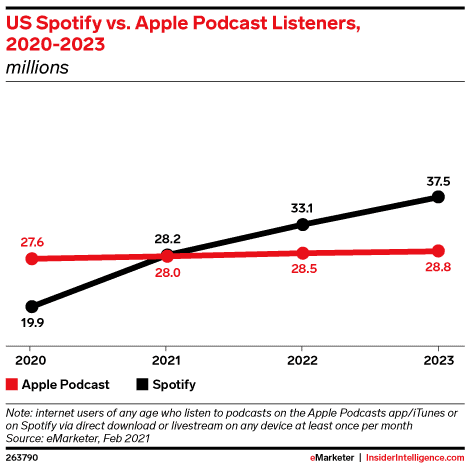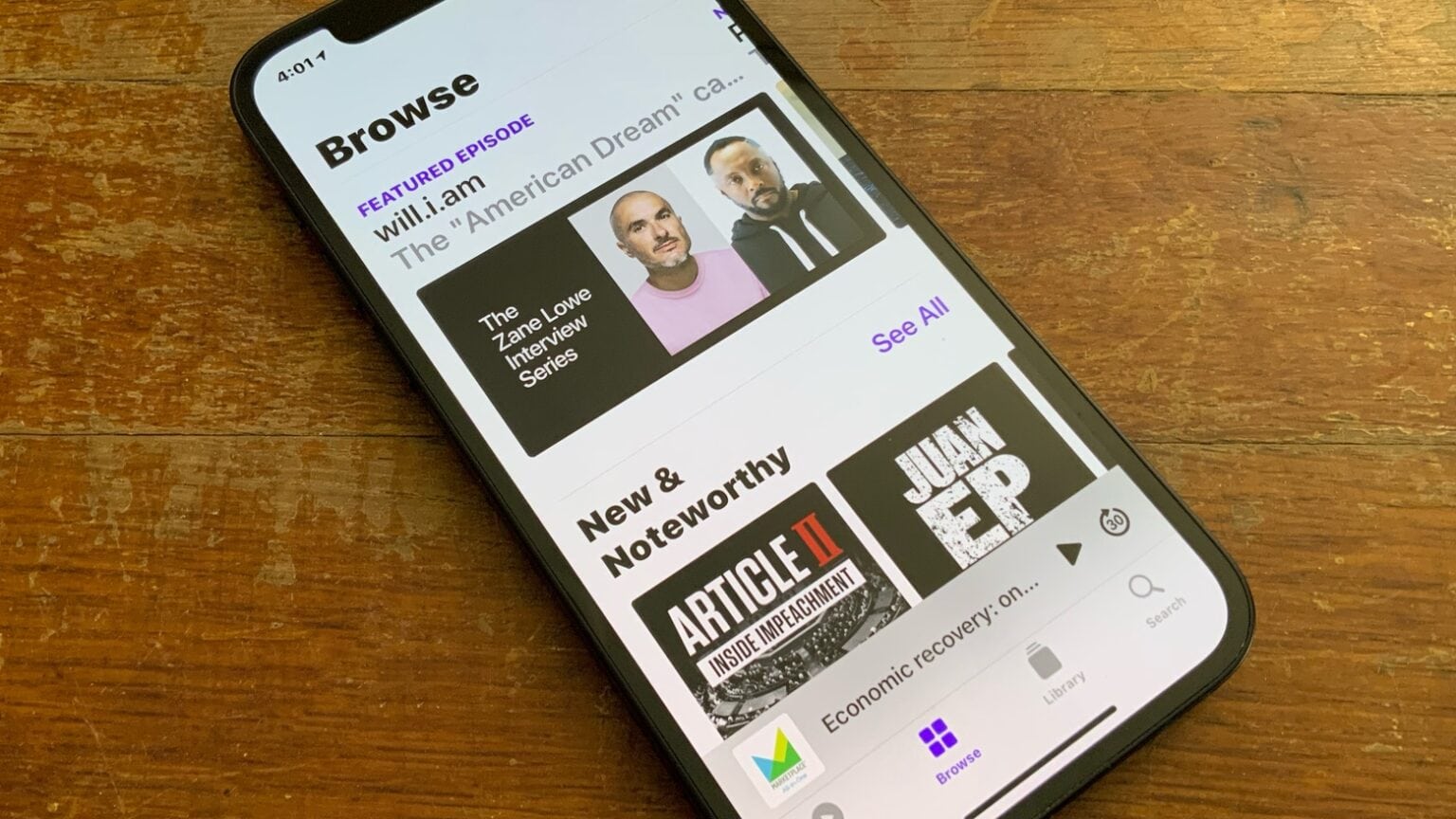Is Apple finally getting serious about podcasting? With a premium podcast service reportedly in the works, and several exclusive shows already online, it looks like Apple might be ready to defend its turf when it comes to the increasingly popular medium.
It’s about time. The company that was so strongly identified with podcasts from the start is rapidly losing its dominance as competitors come on strong. Here’s how Apple could regain its podcasting edge.
Podcasts surge in popularity
Podcasts are big and getting bigger. There are currently 850,000 active podcasts, with approximately 30 million combined episodes. That’s up from 500,000 active podcasts in 2018. More than half of U.S. citizens over the age of 12 listen to podcasts, with 65% of them listening on a mobile device, such as a tablet or smartphone.
The race to capture the world’s ears is on, and the potential rewards are big. This is Apple’s game to lose — but, right now, it runs a serious risk of giving up its lead.
A brief history of podcasting
While the technology behind audioblogging or asynchronous digital radio (aka podcasting) dates back as far as the 1980s, years before Cupertino got involved, Apple is indelibly linked with the technology.
Apple invented both the hardware and the software that gave many people their first experience with podcasts. In fact, the 2004 Guardian article in which journalist Ben Hammersley coined the term podcast mentions Apple in its first paragraph.
“With the benefit of hindsight, it all seems quite obvious,” Hammersley wrote. “MP3 players, like Apple’s iPod, in many pockets, audio production software cheap or free, and weblogging an established part of the internet; all the ingredients are there for a new boom in amateur radio.”
Apple’s eroding market
Apple’s major early contributions to podcasting included the first iPod in 2001 and, later, the iPhone. These mobile devices gave people the hardware to listen to podcasts while on the go. Meanwhile, iTunes gave users the software to download and manage podcasts.
For much of the past decade-and-a-half, Apple’s dominance in this area went unchallenged. The company launched the standalone Podcasts app on iOS in June 2012. It arrived on tvOS in January 2016, watchOS in 2018 and macOS in 2019.
But recently, Apple’s podcasting lead began to erode. Spotify, in particular, took interest in podcasts, galvanizing a field that, outside of Apple, seemed pretty fragmented.
Thanks to a number of shrewd moves, Spotify found podcasting success quickly. A recent report from eMarketer predicts that in 2021, Spotify’s U.S. podcast listenership will surpass Apple Podcasts for the first time — with 28.2 million U.S. users per month for Spotify versus 28 million for Apple Podcasts. By 2023, the firm predicts Spotify will hit 37.5 monthly million listeners in the United States versus Apple’s flat 28.8 million.

Photo: eMarketer
How did Spotify come on so strong, so fast? The company threw big money at podcasting, both in terms of tools for creating and hosting, and by signing big-name talent like Joe Rogan. Spotify paid a reported $100 million for its exclusive deal with the podcasting superstar.
The idea that Apple could lose its early commanding lead might sound surprising, but it’s not unprecedented. Apple innovated in other areas like digital video distribution, only to lose to Netflix, and artificially intelligent assistants, only for Siri to lag behind Amazon Alexa and Google Assistant.
Cupertino fights back
Apple, however, seems to be fighting back when it comes to podcasts. Original podcasts like The Line — the documentary series about a Navy SEAL accused of war crimes — are one example.
With its true-crime bent, The Line seems like a stab at achieving success a la Serial, the ultra-popular podcast that swept the world half a decade ago.
With podcasting, Apple seems intent on taking the Apple TV+ approach: investing in top-notch content and hoping that quality, rather than quantity, can win people over. According to some reports, Apple’s might launch a premium podcast service as early as today.
Similar to Apple News+, the premium podcast service — let’s call it Apple Podcasts+ — supposedly has been discussed internally, with overtures made to some creators.
Is Apple Podcasts+ the right move?
Personally, I think this is entirely the wrong move. Another subscription service would just put Apple’s podcasts in a silo. No matter how good the shows turn out to be, the appeal of podcasts is their openness as a platform. Yes, some premium podcasting services exist. But have they produced any major hits? Notably, Rogan’s shows are available to anyone with a Spotify account, not hidden away behind a paywall.
How Apple can win podcasts war
Apple does have a few aces up its sleeve when it comes to podcasts, though. If Apple focuses on these aspects, it could retain (or regain) its podcasting crown.
Achieving synergy
Synergy is something no other company can do quite like Apple. For example, in 2019, The Pixies created a 12-part podcast series to coincide with the release of the band’s latest album. The podcast offered a behind-the-scenes glimpse at the album’s creation, and served as a nice bit of convergence culture in action.
Two years later — with Apple News+, Apple Arcade, Apple TV+ and Apple Music firing — Apple stands in an even stronger position to pull off this type of cross-platform cross-promotion.
You could have a podcast providing backstory to an Apple TV+ series (which is what Cupertino did with For All Mankind). Or a podcast series that gets turned into an Apple TV+ show (which it’s doing with The Line). Or tie-in games on Apple Arcade, supported by a series of feature stories on Apple News+, aided by a concept album on Apple Music.
It’s a tough bit of synergy to pull off, but Apple’s great at that kind of thing. Heck, the company could apply the same thing to its high-profile hardware releases as well. What tech nerd wouldn’t salivate over the prospect of an Apple podcast diarizing the days leading up to an iPhone launch?
Solving podcast discovery
Podcast discovery is, to put it nicely, borked. Since podcasts are lengthy, free-wheeling bits of audio, it’s much tougher to build a recommendation system for them than for music.
The Podcasts app already recommends “shows you might like” based on your listening habits. But Apple could go further.
Just as Cupertino serves ads to customers based on a variety of contextual data — including device information, location, App Store searches, stories read on Apple News and apps downloaded — it could use this info to expand its podcast recommendations.
Not everyone would be happy with that. But plenty of people would be pleased to discover new podcasts that align with their interests, provided Apple maintains their privacy.
Improving the Podcasts app
The Podcasts app comes as default on Apple devices. Right now, it works pretty well. But Apple could certainly improve it by folding in new features. For instance, adding snippet sharing, automatic transcripts, friend-following and new playback features (think Overcast’s Smart Speed, which speeds up podcasts by auto-shortening silences) would make Apple’s Podcasts app even more popular.
Tapping Apple’s deep pockets
The last, but certainly not least, effort would require leaning on one of Apple’s biggest advantages: its massive cash reserves. Spotify is currently beating Apple Music worldwide. But Spotify, while not shy about spending money, is still just crawling when it comes to profitability.
Apple, on the other hand, has a Scrooge McDuck cash pile it can use. While it’s not in Apple’s DNA to splurge on buying up existing name properties, it could beat Spotify to the punch if it wanted when it comes to securing exclusive deals with top-name podcasting talent.
Apple doesn’t have to make podcasts lucrative on their own. All they need to do is contribute to making users a bit more likely to buy Apple products. This is another reason Apple should keep podcasts free, rather than squeezing a small number of users for a couple more bucks a month for Apple Podcasts+.
Apple is at a crucial juncture right now when it comes to podcasting. Its name is closely associated with podcasts, but the company increasingly runs neck-and-neck with the competition in this area.
If Apple truly thinks podcasts are important, now is the time to make big moves in this domain. Podcasts+ might not hurt the effort. But it wouldn’t be enough. If Cupertino sits on its hands for a few more years, its early-mover lead could evaporate. And it could prove very, very difficult to get that back.
Agree or disagree?
Which podcast service do you use? How do you think Apple could improve the Podcasts app and dominate this sector? Sound off in the comments below.


